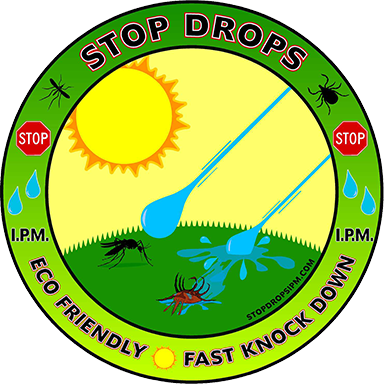
STOP
1. WHAT IS STOP DROPS IPM?
The short answer is: modus operandi. How and Why.
If you want to STOP ticks and mosquitoes in their tracks, you must STOP all stages of their life cycle.
To achieve this, two different application methods are practiced. One better suited for mosquito vectored
disease and abatement. The other is designed to target tick vectored pathogens specifically. By adding some
extra features to the standard mode of mosquito application equipment this is accomplished.
This process and equipment is not something new. It is new to Down East Maine because ticks are on the rise
and are now getting serious attention from State Agencies such as the Centers for Disease Control and
Prevention (CDC). Understandably, mosquitoes in Maine are not nearly the problem they are in the Southern
states, where mosquito borne disease is their primary concern. In Maine, the primary concern is ticks when
addressing vector borne disease. That is why we should be looking at places like Connecticut and Rhode Island. They could
be considered the epicenter of where Lyme disease was first diagnosed and treated. Another valuable resource
are the areas in Southern and Central Maine where ticks and Lyme are commonplace. The real question is: What
can we learn, and how can we benefit from the many years of experience and success that these pest management
companies have had with ticks as the primary vector? For more information, refer to: TickEncouters – Control Ticks in Your Yard; How Does it work?
When Dead Or Alive Makes The Difference
DROPS
2. WHAT ARE DROPS?
When it comes to treating for ticks, the method found to be the most effective is in the difference between
drops and droplets. When treating mosquitoes, a fine mist which produces
droplets is effective in coating both top and bottom of free floating leaves as well as branches in trees
along with smaller bushes. What is left over falls on the grass and ground which is fine. Mosquitoes are born
there. Once mature, they spend most of their harborage time in the foliage, not on or in the ground as ticks do.
For treatment of mosquitoes, the common back pack mist blower is the weapon of choice. However, our vector
borne problem in Maine does not fly or jump like fleas. They crawl to the top of tall grass and small bushes
where they wait for their victims.
Ticks reside deep in leaf litter looking for moisture, only coming out to quest, (looking for a blood meal). If
there is a silver bullet for ticks, it would be the lack of moisture. Without it they desiccate (shrivel up) and
die. The second best thing to a silver bullet would be a soaking spray of the correct arachicides that coats
bushes and grass as it penetrates deep into the leaf litter.
This is not achieved by fine mist droplets, rather coarse spray drops at a much higher volume. The typical mist blower
has a 4 gallon tank. This tank would have to be filled up as many as 15 times for the average house lot. Although it
is possible, it would not be very practical because of the excessive time involved in repeatedly filling the tank.
The companies that primarily focus on ticks use what is called a hydraulic power sprayer which can deliver up to 5
times the volume in the same amount of time. This setup can also spray high up into the trees, where mosquitoes are,
without having to apply any more active ingredient. That’s right... it is the same amount of active ingredient, just
more water which is responsible for delivering this mix of active ingredient through the leaf litter, hitting the target.
Pesticides are now made to be biodegradable, whereas it does have a relatively short life, it needs to contact
its target sooner than later. The extra water volume carries the pesticide to these ticks. For more information refer to: Ticks in Maine; When to Hire a Professional

IPM
3. What is IPM (Integrated Pest Management)
It is a state mandated process of NOT using pesticides exclusively to manage pests. It also incorporates other
green options into the pest management process which include certain landscaping, exclusion, (screens etc), water
reduction and keeping lawns mowed just to name a few. For more recommendations, refer to: The University of Maine; What is IPM?
If just a portion of these recommendations are followed, we can come closer to that STOP ticks and mosquitoes target.
Treatment is the fastest means of arachnid and insect reduction. Good management practices on the home front will make
for a less inviting habitat for these pests.
We all shoot to eliminate all ticks and mosquitoes; however 85%-95% is probably a realistic number for mosquitoes.
With regular treatments this percentage improves over time.
Ticks, on the other hand can be almost totally eliminated at a 95%-100%. The reason is that mosquitoes can fly in,
but ticks crawl, and not very far or fast. Unless they can hitch a ride on a large or small animal, or a human, you
should be safe.